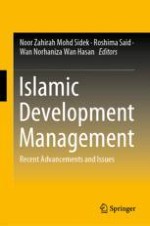2019 | OriginalPaper | Buchkapitel
Challenges for Sustainable Islamic Microfinance Institutions in Malaysia
verfasst von : Md. Faruk Abdullah, Zelhuda Shamsuddin, Suraya Mahmood
Erschienen in: Islamic Development Management
Verlag: Springer Singapore
Aktivieren Sie unsere intelligente Suche, um passende Fachinhalte oder Patente zu finden.
Wählen Sie Textabschnitte aus um mit Künstlicher Intelligenz passenden Patente zu finden. powered by
Markieren Sie Textabschnitte, um KI-gestützt weitere passende Inhalte zu finden. powered by
